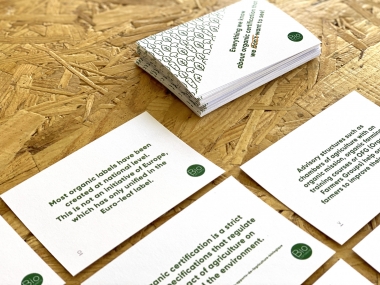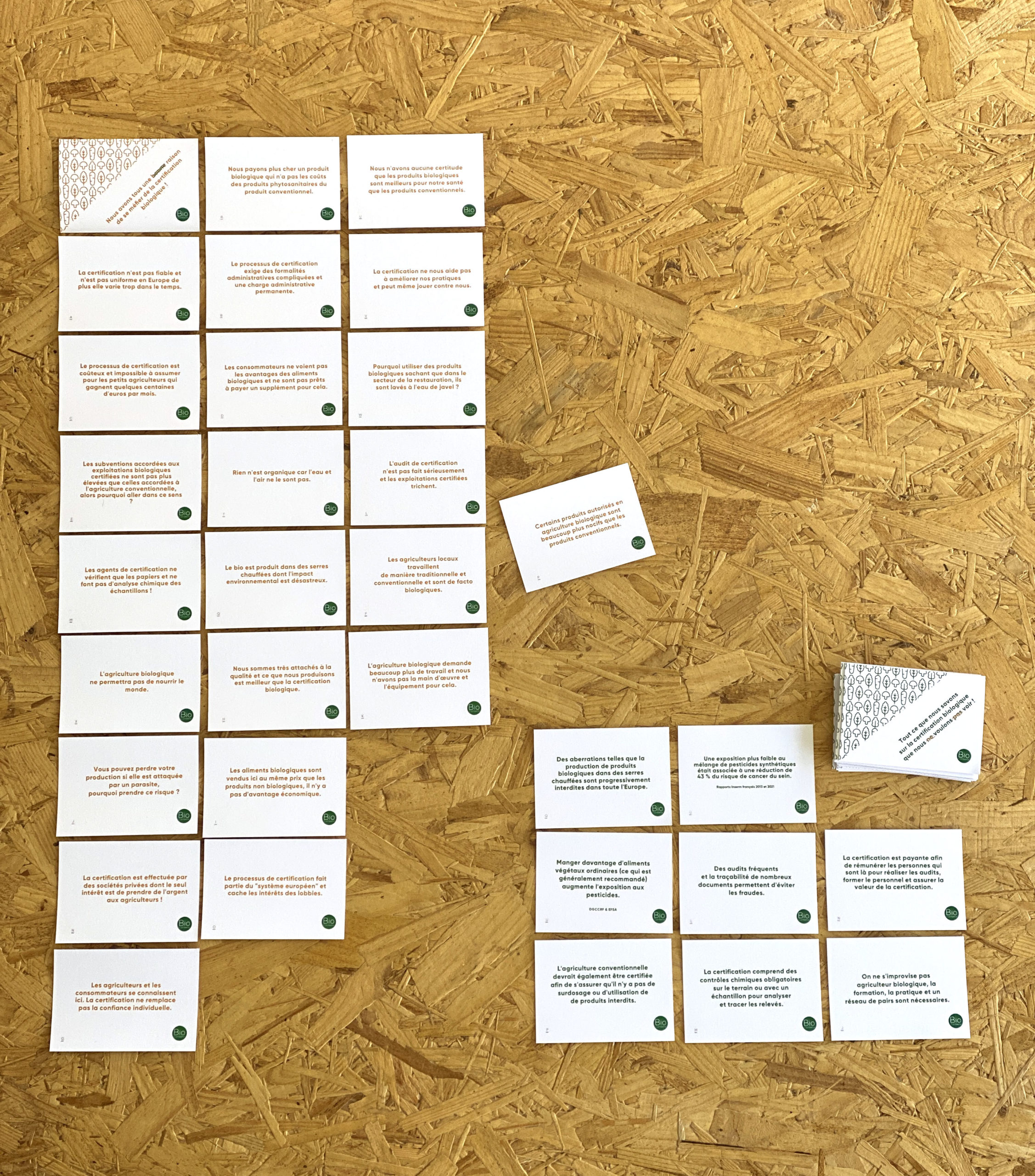We all have a good reason to distrust organic certification!
Edited on
10 May 2022The visits to the 4 initial BioCanteens partner cities revealed different forms of reluctance towards organic certification... which is a bit strange for cities that have just embarked on a process of transferring a Good Practice whose main issue is to to emphasise local and organic food! Beyond this apparent contradiction, local actors are faced with critical difficulties. We take them seriously and have produced two sets of facilitation cards: one entitled "We all have a good reason to distrust organic certification", which brings together all the possible counter-arguments heard in the BioCanteens cities and other network partners.
And a second set of cards entitled "Everything we know about certification that we don't want to see!" providing all the knowledge and arguments that we have been able to gather to to combat stakeholders' distrust of certification. From webinars organised by BioCanteens #2 with 2 leading experts experts in the field, Denis Lairon, Director of Research at INSERN in biochemistry and nutrition and Lise Pujos from Ecocert for the certification process and an active teaching exercise with the students of
students of the University Diploma in Sustainable Food Project Management from the University of Nice-Côte d'Azur have enabled to enrich and consolidate the two sets of cards.
Ready to challenge your colleagues and friends on beliefs and fears about organic food?

Presentation of the game
"We all have a good reason to be suspicious of organic certification". Really?
Organic certification is essential both for human health and for the transition of agriculture. In practice, the transformation of conventional agriculture is not going smoothly, and the exchange with stakeholders often reveals a range of reservations:
Are these attempts to justify resistance to change or are they real technical, administrative or economic barriers?
The card game "We all have a good reason to be suspicious of organic certification!" gather the possible counter-arguments heard from farmers, wholesalers, traders, customers from different partsof Europe where BioCanteens is represented. It does not claim to be exhaustive but already covers a wide range of distrusts, reservations, concerns or beliefs...
Because we believe that organic certification is essential for the food transition, human health and societal resilience, because we know that this process is not without its problems and can certainly be improved, we have called on the same actors, experts in toxicology and certification to build a second set of cards entitled "Everything we know about organic organic certification that we don't want to see!". It provides all the knowledge and arguments we have been able to gather to combat stakeholder mistrust of organic certification.
How to play the game?

You are an elected official in a city and you do not know how to engage in organic certification discussions with local farmers? Or are you a civil servant in administration and you have difficulties in convincing your colleagues about organic certification
Or maybe your children are eating in the school canteen and you don't know how to draw the attention to other parents and city decision-makers about the introduction of organic food in the menus?
In all these or similar situations, use the first set of yellow cards to start a strategic conversation about organic food, consumer health or consumer health or sustainable agriculture.
1/ ask the people sitting around the table to draw a card and read it out loud
2/ display the card on the table and start a series of reactions...
3/ if the counter-argument remains an issue for the participants, keep the card on the table. If not, put it aside and draw another card from the deck...
4/ quickly go through all the cards in the deck if you can, or discuss each one in depth...
5/ in the end, what you get on the table is an overview of the problem: the cards have expressed all the "...reasons to be wary of organic certification!" of your interlocutors
whether they are good or bad...
Then give your audience the second set of green cards green cards:
1/ ask them to take turns drawing the cards and reading them out loud.
2/ check collectively if you can match each green argument card with a yellow counter-argument card on the table.
3/ if you are not sure, use the numbers on the cards to match them (1. with 1.1, 2.2... 2. with 2.1, 2.2, etc.).
4/ review all the green cards and establish a common knowledge of organic certification among your stakeholders...
5/ at the end, what you get on the table is a selection of arguments to deal with the counter-arguments previously raised by your audience.
You have built together: "Everything we know about organic certification...". And most importantly, you have involved your audience in discussing the issues they
problems they face around organic certification, you have opened up the debate and targeted the controversies. Hopefully, you have resolved some issues, defused some misunderstandings, deactivated some irrational fears and focused on some concrete problems that still need to be solved...
At least you built a solid common knowledge in a relaxed and interactive session and clarified the signal of all the
noise that hinders the collective effort towards a certified certified organic food ecosystem!
We hope you can all enjoy the game and play it around with the more convinced, and especially with the more skeptical actors around you!
You can find the card game at this link
Text and Tool Elaborated by François Jegou with the support of the SDS team
Submitted by Clara Garrone on
